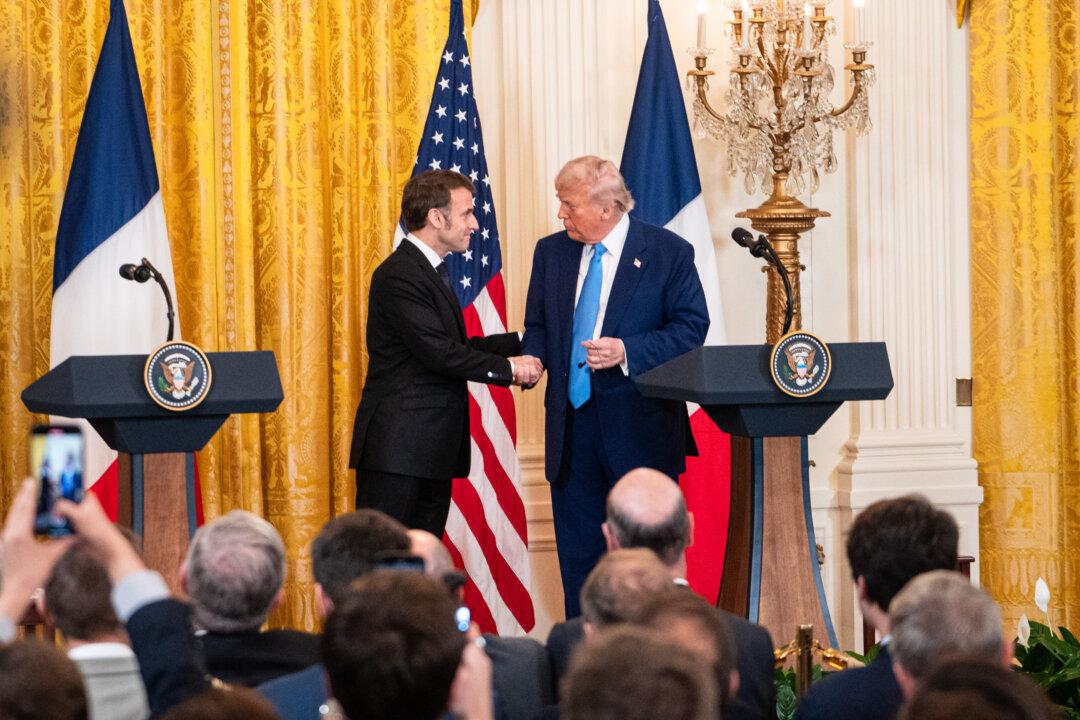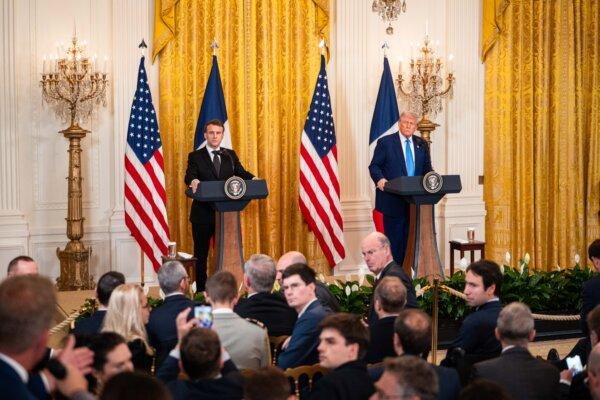‘Our focus is on achieving a cease-fire as soon as possible, and ultimately a permanent peace,’ Trump said.

WASHINGTON—During a meeting at the White House on Feb. 24, U.S. President Donald Trump and French President Emmanuel Macron both voiced a strong desire to end the war in Ukraine swiftly, although their differing views on key issues, such as Ukraine’s reconstruction, security guarantees, and the use of frozen Russian assets, became more apparent.
Trump kicked off a week of intense diplomacy by holding his first meeting with Macron as he looked to advance peace talks between Russia and Ukraine. He is also scheduled to meet with UK Prime Minister Keir Starmer on Feb. 27.
“Our focus is on achieving a cease-fire as soon as possible, and ultimately a permanent peace,” Trump said during a joint news conference after his bilateral meeting with Macron.
“I believe that Emmanuel agrees with me on many of the most important issues, chief among them is, this is the right time. It may be the only time,” Trump said, referring to the peace deal.
He praised Macron for agreeing that Europe, not just the United States, should bear the cost of securing peace and ensuring Ukraine’s long-term security.
Trump also said that his administration is taking a “decisive break” from the foreign policy approach of the Biden administration.
Macron agreed with Trump’s desire to end the war but reiterated that Ukraine’s and Europe’s interests should be taken into consideration.
“We want peace swiftly, but we don’t want an agreement that is weak,” Macron said.
The French president noted that the security guarantees would be negotiated as part of a comprehensive peace and security package in due time, saying that Trump has endorsed that approach.
“That’s a turning point, in my view,” Macron said.
Trump did not comment much on security guarantees to Ukraine.
“Europe must take that central role in ensuring long-term security of Ukraine, which they want to do. And that’s not a very big step,” Trump said.
“A big step is what’s going to happen over the next few weeks,” he said, referring to the peace talks.

When asked by a French reporter about contributing to Ukraine’s reconstruction in the future, Trump did not commit to providing aid.
He called the question a “little strange,” noting that the United States has already made big contributions to Ukraine’s defense.
Macron suggested that frozen Russian assets should be included in peace negotiations and used to support Ukraine.
“I support the idea to have Ukraine first being compensated,” he said. “It will be a loan at the end of the day, and Russia will have paid for that.”
Trump interrupted Macron. “If you believe that, it’s okay with me,” Trump said.
“We’re negotiating everything, and everything’s on the table.”
Kateryna Odarchenko, political consultant and partner at SIC Group, pointed out differences in opinion that emerged during the meeting.
“It’s important to note that while President Macron has clearly identified Russia as the aggressor in the conflict, President Trump has refrained from labeling President Putin as a dictator, highlighting nuanced differences in their approaches,” she told The Epoch Times.
Talks With Russia
Macron’s visit to the White House fell on the third anniversary of the start of the conflict between Ukraine and Russia. Somber ceremonies in Ukraine marked the loss of hundreds of thousands of soldiers.
Trump announced on Feb. 24 that negotiations with Russia are proceeding and that the two nations are looking to boost trade and economic ties in the near future.
“I am in serious discussions with President Vladimir Putin of Russia concerning the ending of the War, and also major Economic Development transactions which will take place between the United States and Russia,” the president posted on his Truth Social platform. “Talks are proceeding very well!”
Steve Witkoff, U.S. special envoy to the Middle East, made similar remarks on CBS’s “Face the Nation” over the weekend, stating that U.S. companies would be able to return to Russia after the peace deal.
An in-person meeting with Putin is expected, according to statements from Trump in recent weeks. No date has been provided yet.
“At the appropriate time, I would go to Moscow,” Trump told reporters during the bilateral meeting. “I think the war can end soon—within weeks.”
Tariffs on the European Union were also discussed during the bilateral meeting, following Trump’s warnings that the bloc would be targeted for unfair practices such as high trade barriers and VATs that harm U.S. businesses and workers.
“The American and European economies are extremely intertwined,” Macron said during the news conference.
He said both U.S. and French teams, including ministers and secretaries, would continue discussions to address some of the differences.
During an interview with CNN aired on Feb. 23, the French president warned that U.S. tariffs on Europe would increase inflation for Americans and miss a bigger issue for the U.S. economy.
“Is the European Union your first problem? No, I don’t think so. Your first problem is China, so you should focus on the first problem,” Macron said.
On Feb. 18, U.S. and Russian officials met in Saudi Arabia to explore cease-fire terms. Ukraine was not at the negotiation table, which raised alarm in Ukraine and the EU.
The U.S. president recently questioned Ukrainian President Volodymyr Zelenskyy’s role and effectiveness in past negotiations related to the war.
Last week, he traded barbs with Zelenskyy, calling him a “dictator” for not holding elections during the war. The Ukrainian leader accused Trump of being in a “disinformation space.”
Trump later said that a deal with Ukraine is nearly finalized to grant the United States access to the country’s rare earth minerals in return for the U.S. aid provided thus far.
“I think that that’s happening. I think we’ve made a lot of progress,” Trump said during the news conference.

